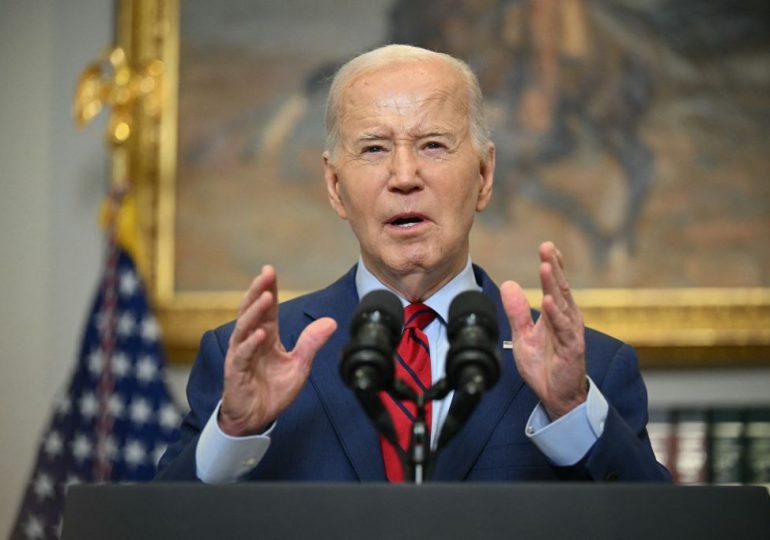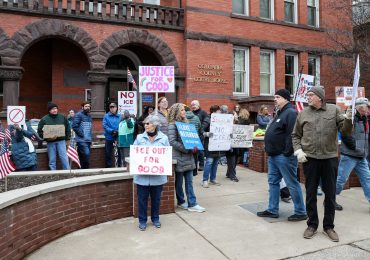Amid a surge in hostile clashes on college campuses across the country over the war in Gaza, President Biden on Thursday gathered reporters in the cramped Roosevelt Room across the hall from the Oval Office. In televised remarks, he said peaceful protests are an American tradition but “violent protest is not protected.”
[time-brightcove not-tgx=”true”]
As he walked out, a reporter asked if the protests had forced him to reconsider his policies in the Middle East. Biden was unequivocal.
“No,” he said.
Biden has stuck with Israel despite his own mounting frustrations with Israeli Prime Minister Benjamin Netanyahu, widespread criticism of Israel’s indiscriminate bombing campaign in Gaza as well as its blocking of humanitarian aid to Palestinians, and increasing protests against his policy. He’s done so because Biden sees threats to Israel coming from beyond Hamas, says a White House official, and believes bolstering Israel’s security as pivotal to preventing current conflicts from mushrooming into a wider war across the Middle East.
“I’m never going to leave Israel. The defense of Israel is still critical,” Biden said during a March 9 interview with MSNBC’s Jonathan Capehart.
In the seven months since Hamas’ Oct. 7 assault on Israel, in which they killed more than 1,200 people and took more than 200 hostages back into Gaza, Israel has been attacked by Iranian-backed Houthi militias in Yemen to the south, by militants in Iraq in the east and by Hezbollah in Lebanon along its northern border. And on April 14, Iran launched more than 300 rockets and drones at Israel, the first ever direct attack on Israel by Tehran.
“The missile and drone barrage was a reminder of just how dangerous a neighborhood Israel lives in and the threats they are facing from Iran’s proxies,” says a White House official.
The backlash has grown against U.S. support for Israel in recent months as Israeli bombardments killed tens of thousands of people in Gaza during Israel’s effort to destroy Hamas. Police have arrested more than 2,100 people during pro-Palestinian protests across dozens of college campuses in recent weeks, according to the Associated Press. While many of the protesters are pushing for colleges to unwind investments in Israel, their efforts have also been aimed at Biden’s handling of the conflict.
Biden faces increasing dissent over his Israel policy from within his own party, and concern is growing that the issue is sapping his support from Democratic Party activists, and young voters more broadly, at a time when Biden needs them to help mobilize for the election in November.
Read more: Exclusive: Trump Says Netanyahu Deserves Some Blame for Oct. 7
Senator Bernie Sanders, one of the most outspoken critics in Congress of Biden’s Israel support, said on CNN on Thursday that he worried Biden’s Israel policy has alienated young people and a lot of the Democratic base, describing Gaza as “Biden’s Vietnam.” President Lyndon Johnson, who had scored major policy wins in expanding health care and anti-poverty programs, decided not to run for reelection in 1968 because the protest movement against his escalation in Vietnam had scuttled his party support within the Democratic Party.
In recent weeks, Biden has increased his criticism of Netanyahu. He said on MSNBC in March that the Israeli leader “must pay more attention to the innocent lives being lost as a consequence of the actions he’s taken.” In a tense phone call last month, he told Netanyahu to take immediate actions to protect civilian lives and allow food aid into Gaza, threatening to change his administration’s support for the country’s military campaign against Hamas otherwise.
But Biden has shown little sign of being swayed away from what he has described as his “ironclad” support for Israel.
Despite political pushback from the left, Biden lobbied hard to get the House and Senate to pass a $95 billion foreign aid package in April that included $26.4 billion for Israel.
The need for such long-term funding for Israel’s military defense was made more clear after Iran’s military strike on April 14, supporters say. “The bill will also help replenish Israel’s air defenses, which is even more important following Iran’s brazen and unprecedented attack,” said Biden’s National Security Advisor Jake Sullivan on April 24. “It will help ensure that Israel has what it needs to defend itself against the very real threats it faces from Iran as well as Iran’s proxy groups.”
Biden has struggled to find ways to simultaneously show U.S. support for Israel’s defense and pressure Netanyahu to alleviate the humanitarian crisis unfolding in Gaza. Since Biden’s threat to Netanyahu, the U.S. says it has seen some increase in aid getting into Gaza. But now Israeli military planners are readying forces to invade the city of Rafah in southern Gaza where more than 1 million people have sought shelter. U.S. officials are raising alarms about the possible civilian death toll, and have implored Israel to target Hamas leaders with tactics that avoid civilian deaths.
Bradley Bowman, the senior director of the Center on Military and Political Power at the Foundation for Defense of Democracies, says that when Iranian leaders call for “death to Israel,” American policy makers should take that threat seriously. “The Islamic Republic of Iran is clearly seeking a ring of fire strategy that seeks to surround Israel for the purpose of ultimately exterminating the Jewish state,” says Bowman. It’s that broader threat to Israel that makes Biden unlikely to reduce military support, even in the face of protests.
Leave a comment








